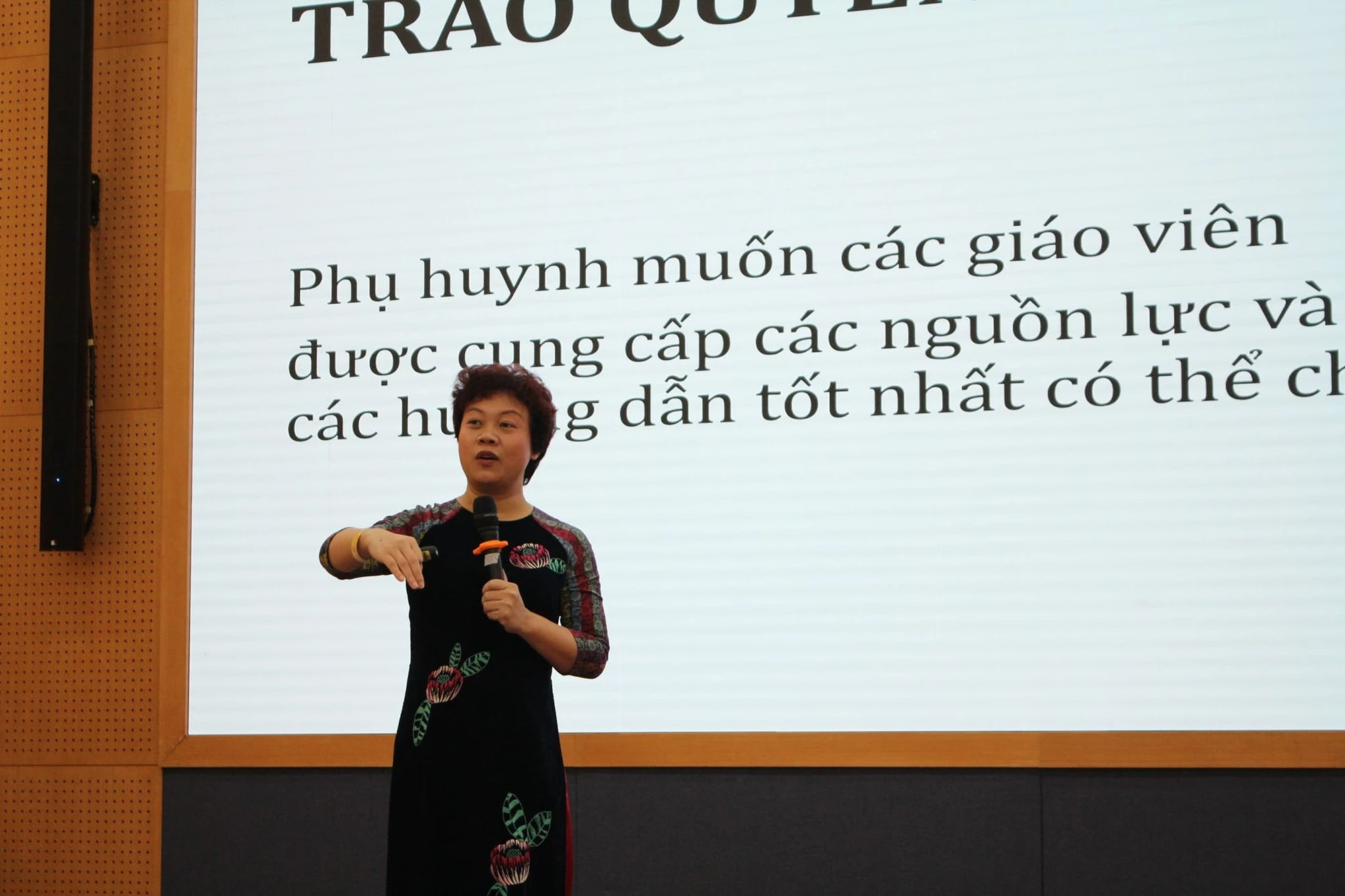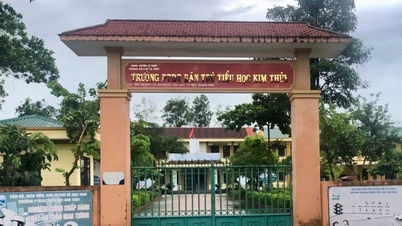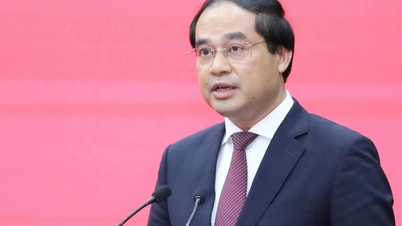Talking to Thanh Nien , Associate Professor Chu Cam Tho expressed that he did not know since when mid-term assessment was called mid-term exam. "Examining students is so difficult! Exams for teachers are equally difficult!", Associate Professor Tho shared.
According to Associate Professor Tho, periodic assessment is the educational result of students after a period of study and training, aiming to determine the level of completion of students' learning tasks compared to the knowledge and skills standards prescribed in the general education program. However, for a long time, when it was turned into an exam, it has caused many "sins" that teachers, parents, and students pay too much attention to, resulting in "studying what you take the exam". Whatever the "matrix" of exam questions, what type of exam questions, what outline... people will get used to, review... to get good results. If not for the individual, they will get a bad score, if the quality of the class and school is not high, then there is no "sin" to escape.

Students at all levels are in the final exam period of semester 1.
A SEEMINGLY OBJECTIVE BUT VERY TOUGH ASSESSMENT
So what are the consequences of the Department of Education and Training organizing mid-term exams with common questions for schools in an entire district or county, madam?
Currently, according to Circular 22/2021/TT-BGDDT, the scores for assessing the learning outcomes of secondary school students are confirmed by regular assessment scores (coefficient 1), mid-term (coefficient 2), and final (coefficient 3). If the Department of Education and Training organizes mid-term and final exams... then teachers will only be able to autonomously assess students through regular assessment (coefficient 1)! Just by analyzing like that, we can see the psychology of teachers and students that the way the exam is, they will teach and learn like that.
Not to mention, organizing a general exam at the district level (considered equivalent to a large-scale assessment) is very "complicated". The burden also increases because of that. Students will be absent from school, will not study according to the normal timetable; there will be groups of teachers and staff to create questions, invigilate, grade exams...
Nowadays, large-scale assessments require changes in organizational methods such as applying technology, digital transformation, etc. to ensure the function of such an exam. But in reality, the number of localities that can do so is very rare. Therefore, an assessment that seems objective but is very cumbersome, lacking value for improving the quality of education.
As a researcher in educational assessment, having experienced different positions in a common exam, I still feel tired for each exam like that. But I know for sure, teachers and students are the ones who are most tired, feel the most scared before, during and especially after the exam.
When will the painful cycle of "studying for exams" end? Even when studying in school, where there are several exams each year, it is not enough to adapt to the big exams of life.
N MISCONFUSING PERIODIC ASSESSMENT INTO CLASSIFICATION AND SELECTION
Madam, many localities when conducting periodic centralized assessments often think that the purpose is to assess the general quality of students. If each school sets its own questions, the different levels of questions may not accurately reflect the general quality. Is that appropriate?
First of all, this is not a selective exam. If managers want to know the real quality of education, they must rely on the whole process. In this case, is the goal of secondary education to reach the standard for grade 10? How will the streaming work be? How will students who do not want to enter grade 10 be evaluated, and what is the quality of that?
The spirit of innovation in testing and assessment for many years now is that assessment is closely linked to teaching, is a part of the educational process, providing information to adjust teaching methods, not just "confirming students' learning outcomes". Therefore, teachers are empowered and need to be trained to have assessment capacity, to assess students during the teaching process and also periodically.
Yet this year, the fourth year of officially implementing the 2018 General Education Program, many Departments of Education and Training still organize mid-term exams using common exam questions for the entire district/county. Considering the functions and tasks of a management unit and the significance of educational activities, I think this is an unnecessary management activity, somewhat abusive in this context. At the Department of Education and Training level, periodic assessments should only be conducted once a year/time/class of students, with priority given to final classes.

Associate Professor Chu Cam Tho, Head of the Department of Educational Evaluation Research (Vietnam Institute of Educational Sciences )
What principles should be followed in creating exam questions on a large scale? According to your observation, have the Departments of Education and Training ensured standardization in the question-making process when organizing mid-term exams with general questions?
According to regulations, large-scale assessments (organized at district, provincial, national, and international levels) with thousands of students participating must comply with very strict requirements with questions and exams that must be standardized, objective, and focused on meeting program standards. Organizing periodic assessments focused at the department/office level is considered equivalent to large-scale assessments in terms of scale.
To do this, in practice, organizing units often do the following: establish an organizing committee, including a question-making team, an appraisal team, exam boards, exam grading boards, etc.; organize the exam, each school has an exam board, with registration numbers, marking, creating exam rooms, dividing students into rooms, and cross-grading.
However, I have never been exposed to any quality assessment of an exam published by the exam organizing agencies. I often receive feedback information: the exam is not as good as expected (some exams are published in newspapers, due to questions that are not of good quality, leaked questions, etc.); the results are not objective (for example, teachers reflect that cross-marking is incorrect or the scores are too high, too low, etc. compared to the actual scores of some students). Those feedbacks are phenomenal, so it is even more necessary that each such assessment must be evaluated objectively and scientifically; because affecting thousands of students and teachers is never a small matter.
Teacher training, correct assessment of student capacity
The important issue is how to limit large-scale exams while still ensuring the quality of teaching among schools? Associate Professor Chu Cam Tho believes that to successfully carry out the new, humane, and modern goals that we expect, we not only need to make efforts to innovate the teaching and learning of teachers and students, but also need managers at the grassroots level to change; specifically, to effectively use quality management tools correctly and meaningfully.
As mentioned above, it is necessary to train and support teachers so that they have the capacity to evaluate learners; create a teaching environment so that evaluation is implemented correctly, in parallel with teaching. At the same time, it is necessary to make the most of scientific results, especially technology, to make each of these exams less stressful, achieving universality and objectivity.
Periodic assessments need to be used at the right time and in the right way in the educational context, avoiding abuse. How to make the information obtained from student assessment first of all perform its pedagogical function, which is to respond to teaching and learning; help each relevant subject realize the need to adjust; correctly assess student capacity with good methods is the "reverse steering wheel" for educational operations. Only then can we create an environment where teachers can confidently teach and students can enthusiastically learn.
Source link


![[Photo] General Secretary To Lam, Secretary of the Central Military Commission attends the 12th Party Congress of the Army](https://vphoto.vietnam.vn/thumb/1200x675/vietnam/resource/IMAGE/2025/9/30/9b63aaa37ddb472ead84e3870a8ae825)

![[Photo] Panorama of the cable-stayed bridge, the final bottleneck of the Ben Luc-Long Thanh expressway](https://vphoto.vietnam.vn/thumb/1200x675/vietnam/resource/IMAGE/2025/9/30/391fdf21025541d6b2f092e49a17243f)
![[Photo] President Luong Cuong receives President of the Cuban National Assembly Esteban Lazo Hernandez](https://vphoto.vietnam.vn/thumb/1200x675/vietnam/resource/IMAGE/2025/9/30/4d38932911c24f6ea1936252bd5427fa)
![[Photo] The 1st Congress of Phu Tho Provincial Party Committee, term 2025-2030](https://vphoto.vietnam.vn/thumb/1200x675/vietnam/resource/IMAGE/2025/9/30/1507da06216649bba8a1ce6251816820)
![[Photo] Solemn opening of the 12th Military Party Congress for the 2025-2030 term](https://vphoto.vietnam.vn/thumb/1200x675/vietnam/resource/IMAGE/2025/9/30/2cd383b3130d41a1a4b5ace0d5eb989d)


































































































Comment (0)